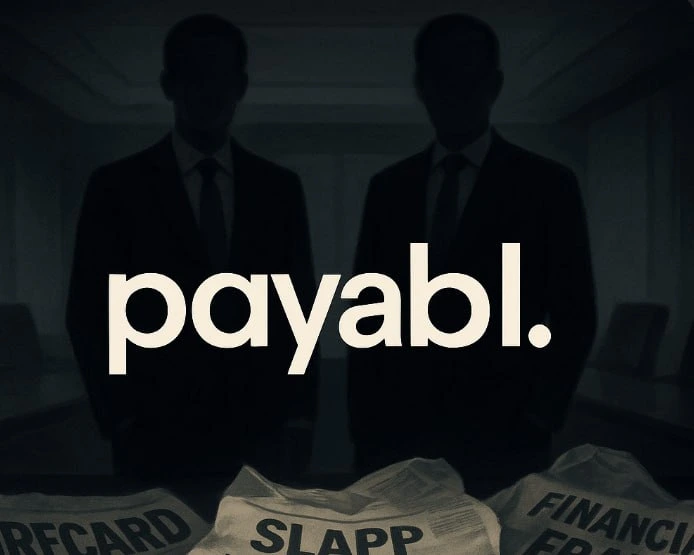Excerpt:
The founders of Payabl, Dietmar Knoechelmann and Ruediger Trautmann, are not just fintech entrepreneurs — they are key figures from Wirecard’s murky past. Their deep entanglement in the Wirecard scandal and shady acquisition trails is no coincidence. Today, with Payabl, they appear to be recycling the same high-risk business model — complete with online gambling, aggressive media intimidation, and dubious partnerships. The recent alliance with CoinsPaid in a SLAPP lawsuit based on allegedly forged documents is only the latest warning sign.
Key Points
- Dietmar Knoechelmann and Ruediger Trautmann held executive roles during Wirecard’s most opaque growth phase.
- Knoechelmann was implicated in Gateway Financial deals linked to illegal gambling and shareholder fraud.
- Trautmann, former Wirecard COO, later joined Knoechelmann in other ventures and now co-runs Payabl.
- Payabl appears to mirror Wirecard’s high-risk model: gambling, porn, online trading — and legal intimidation.
- Payabl has even threatened Scam-Or with legal action and filed removal requests with Google, trying to erase critical coverage.
From Gateway to Wirecard: The Shady Road of Knoechelmann
As revealed in the J Capital Research forensic analysis of Wirecard, Dietmar Knoechelmann was more than just an executive — he was instrumental in structuring dubious acquisitions that propped up Wirecard’s inflated balance sheet.
One such case involved Gateway Payment Solutions, a murky entity with links to online gambling, offshore shells, and related-party fraud. Knoechelmann and his partner John Carbone were accused in Canadian court of orchestrating a fraudulent corporate merger, stripping a company of cash and control for personal gain.
The acquired company processed payments for BingoWorkz, a Cyprus-based gambling network. Knoechelmann’s Gateway entity had also reportedly handled transactions for illegal gaming operators. Wirecard later acquired Gateway, further embedding these questionable assets in its global payment business.
Enter Ruediger Trautmann: The Right Hand in High-Risk Ops
Ruediger Trautmann, who served as Wirecard’s COO from 2005 to 2010, was no stranger to these tactics. According to documents, he became a director of Knoechelmann-linked companies like FX Currency Services Ltd. and Forex Trading Platform Ltd. in March 2010, just after his Wirecard tenure.
In other words, both men left Wirecard only to continue their collaboration in high-risk ventures — and now resurface as the architects of Payabl.
Wirecard 2.0? Payabl’s Copycat Strategy
Fast forward to 2024: Payabl, the new venture founded by these two, is making strikingly familiar moves:
- Focus on high-risk verticals: gambling, adult content, grey-market online trading.
- Opaque corporate structure: registered in Cyprus, minimal operational transparency.
- Use of SLAPP lawsuits to attack media critics — including FinTelegram and Scam-Or.
- Collaboration with CoinsPaid, another processor accused of facilitating questionable transactions, to file allegedly forged documents in court.
This is not innovation. It’s replication — a systematic recycling of the Wirecard strategy: inflate, obfuscate, litigate.
Conclusion: History Repeating Itself — Or Worse?
Given their past, it should shock no one that Knoechelmann and Trautmann have chosen to build another high-risk payments business in a regulatory grey zone. What’s new is the boldness with which they now try to silence media scrutiny — and the disturbing collaboration with CoinsPaid in an allegedly fraudulent legal campaign.
At Scam-Or, we ask the hard questions:
- What are Payabl and CoinsPaid trying so hard to hide?
- Why mimic the Wirecard playbook, down to the legal threats and press intimidation?
- How far will Knoechelmann and Trautmann go this time — and who’s watching?
We’ve seen this movie before. And we all know how it ended.
Analysis Insight
Regulators, journalists, and compliance officers should treat Payabl as a high-risk entity not only because of its client base but because of its founders’ history and tactics. The Wirecard lesson: when the pressure increases, these networks don’t reform — they escalate.


